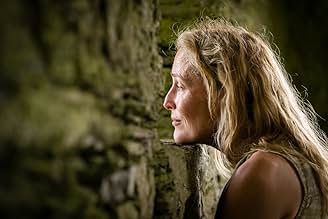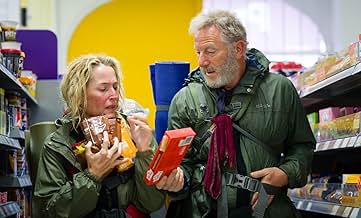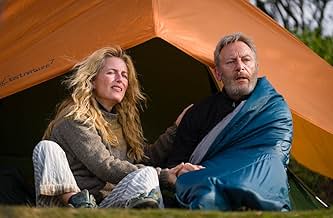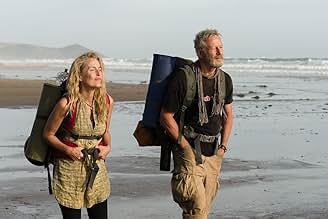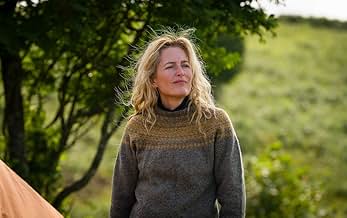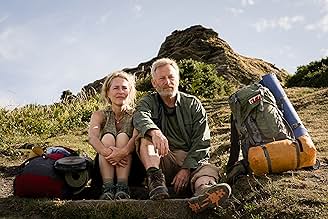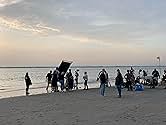Nachdem sie gewaltsam aus ihrer Heimat vertrieben wurden, fasst ein Ehepaar den verzweifelten Entschluss, entlang der Küste Südwestenglands zu wandern, in der Hoffnung, in der Natur Trost un... Alles lesenNachdem sie gewaltsam aus ihrer Heimat vertrieben wurden, fasst ein Ehepaar den verzweifelten Entschluss, entlang der Küste Südwestenglands zu wandern, in der Hoffnung, in der Natur Trost und ein Gefühl der Akzeptanz zu finden.Nachdem sie gewaltsam aus ihrer Heimat vertrieben wurden, fasst ein Ehepaar den verzweifelten Entschluss, entlang der Küste Südwestenglands zu wandern, in der Hoffnung, in der Natur Trost und ein Gefühl der Akzeptanz zu finden.
- Regie
- Drehbuch
- Hauptbesetzung
- Auszeichnungen
- 1 Nominierung insgesamt
Empfohlene Bewertungen
There is no doubt that what drew me to this movie was the casting of Gillian Anderson and Jason Isaac. Two supreme actors who continue to enthrall me and entertain. I soon became engrossed in the story and was mesmerised by both actors, whose performances brought into stark reality the awful circumstances of their characters. Tragic, dramatic but heartwarming this is not a movie of sensations but it is gritty realism. Great production and wonderful images of the beautiful south west of England are a great backdrop to this harrowing journey that set a stunning contrast to the pain and anguish of the plight of the two. Hats off to Gillian and Jason for very fine performances and for recreating the accents and manner of speech of the midlands characters. This film impressed me and left me wanting more.
Based on the true story of Moth (Jason Isaacs) and Ray (Gillian Anderson) Winn, who after losing their house in an unspecified court procedure, discover that Moth has an incurable illness. Homeless, they decide to walk from Minehead to Land's End. After many difficulties and adventures they arrive, but with a brand new existential mindset based around 'home' being not their old farmhouse, but wherever they happen to be.
It's a lovely story written from Ray's 600 pages of notes she wrote during their journey, and in a nutshell sends a message of never give up, always keep hope, recognise what you have instead of what you haven't.
Isaacs plays an excellent part, Anderson is good, but lacks the depth of acting needed to make the role great. There's some beautiful countryside and great editing and all in all I give it a solid 7.
It's a lovely story written from Ray's 600 pages of notes she wrote during their journey, and in a nutshell sends a message of never give up, always keep hope, recognise what you have instead of what you haven't.
Isaacs plays an excellent part, Anderson is good, but lacks the depth of acting needed to make the role great. There's some beautiful countryside and great editing and all in all I give it a solid 7.
I knew nothing of the source material memoir (never even knew it existed), so that didn't color my experience. As a man in his early 60s, what I saw was an authentic relationship of a middle-aged couple embarking on a journey to put a crisis behind them, still deeply in love despite it all and there for each other, support each other and rest in one another. The screenplay might have felt meandering at times, but that's because it's not the three-act "Hero's Journey" we're used to. Moth and Ray are literally trying to find their way after their life is upended, and the characters they meet along that path are various aspects of life. If you're willing to let things unfold, highly recommended.
I was lucky enough to see the film at the Picturehouse Central, Piccadilly Circus, with a Q&A afterwards where the writer Raynor Winn, director Marianne Elliott and screenwriter Rebecca Lenkiewicz were joined by actor Jason Isaacs who played Raynor's real life husband Moth.
I'm going to stick my neck out here and maybe even provoke a bit of negativity by saying that isn't a great film.
Don't get me wrong, I anticipate it getting a very solid if not outstanding imdb rating around the 6.7 mark but purely as a film this isn't up there with a work of fiction like say The Shawshank Redemption or even a film based on a true story like The Pursuit of Happyness.
But if you stopped reading there you'd miss a lot about this film and whether you should watch it - because for all of its shortcomings I think a lot of people will enjoy this film and I'd go so far as to say love this film.
So the Salt Path is a film based on the book by the same name by Raynor Winn about a wild camping coastal walk she and her husband undertook following a sudden downturn in their financial fortunes meaning they effectively became homeless late in middle age losing all the material wealth they had worked for in life up to that point. Don't worry by the way, there are no spoilers here and nothing I say will go much beyond what you'd glean from the trailer and film promotion interviews.
So the film is essentially a journey, metaphorically but also literally a long walk in South West England starting in Somerset and intercut with flashbacks. It's not a glamorous Hollywood Thelma and Louise style road trip in an open top car but a rather more reserved and parochial simple backpacking walk along the admittedly equally dramatic and beautiful scenery of the England coastline.
In fact with Moth - yes that's moth like in butterfly - the husband, he has an illness so it's not even a straightforward walk with him often clearly struggling and his wife Raynor, the writer of the book the film is based on, literally physically supporting him.
Now the character names are rather curious but this is a true story so they aren't made up. Moth is reminiscent of the moth that flies too close to the flame and winn is like winner which is ironic given the couple's change of fortunes, the nature of which is gradually revealed to us in flashbacks over the course of their journey.
In the Q&A after the screening reference was made to the film being a three hander with husband and wife of course but nature as the third hand - and there certainly are some beautiful shots of the natural world which provide a variously calming and dramatic backdrop to the physical, mental and emotional challenges faced by the protagonists. Jason Isaacs made the point however that there are other characters in the film and how they perceive and treat the couple is equally telling of humans and society in general and the sometimes flawed judgements we inevitably make.
But I did like this film, I even loved it in parts but by that I don't mean a particular narrative sequence or particular cinematic elements of the medium.
I didn't love it particularly for the story which is engaging though not molded to conform to the traditional Aristotelian dramatic three act or epic hero's journey form.
Neither for the acting which by Gillian and Jason especially is solid, believable and heartwarming.
Nor for the directing which gives us the shots and performances needed to tell the story.
Now Director Marianne Elliott comes from a theatre background and this is her first foray into film. In the Q&A she revealed she wanted her first film to have an older strong female protagonist and be cinematic, playing to the medium's strengths - in fact she chose the screenwriter Rebecca Lenkiewicz for her ability to tell a story without words and the cinematography effortlessly shifts from intimate closeups of the couple to sweeping vista drone shots.
The editing in turn intrigues and satisfies to keep us engaged, the music is moving and the costume and make up well executed - I've never seen Anderson look so convincingly haggard in scenes and the bravery to show herself in that way reminded me of the similarly exceptionally beautiful Nicole Kidman in Destroyer.
But again none of these aspects are why I loved The Salt Path. So if not for story, acting, directing, cinematography, editing, music, costume or makeup then what?
Well, like Oppenheimer, which despite the awards and plaudits, is a very flawed film, this is an important story.
It's a story of the love and resilience of our protagonists but equally ther relationship with the natural world and its power to inspire and heal us - a magical and mystical power that is all the more astonishing by being around us and familiar to us every single day of our lives.
The sense in the film of the love between husband and wife is palpable and the characters themselves are intriguing. We are left wondering what they did in their lives up to where we meet them. Jason Isaac's character, Moth, is an affable polymath who can as easily turn his hand to a spot of DIY as literary analysis of epic poetry.
Now the film never brought me to tears even though the trailer almost did - not least because of the transcendent life affirming score by Chris Roe. And it didn't fill me with inspiration for what humans are capable of in the face of adversity. Neither did it thrill me with twists, turns and clever plot devices.
But what it did do is leave me with a feeling.
The feeling of a real sense of the love between the husband and wife protagonists. A feeling of optimism about our most intimate human relationships - by which I mean our relationships with each other but also our relationship with the natural world we are all part of.
I said this isn't a great film. And I stand by that. There are films that employ the many strengths of the medium better. But it's a film I enjoyed and in many ways loved. I came away from it feeling love - both for the storyteller and the truth behind the story itself.
So not a great film in the traditional sense. But a lovely film! And I wish it every success.
I'm going to stick my neck out here and maybe even provoke a bit of negativity by saying that isn't a great film.
Don't get me wrong, I anticipate it getting a very solid if not outstanding imdb rating around the 6.7 mark but purely as a film this isn't up there with a work of fiction like say The Shawshank Redemption or even a film based on a true story like The Pursuit of Happyness.
But if you stopped reading there you'd miss a lot about this film and whether you should watch it - because for all of its shortcomings I think a lot of people will enjoy this film and I'd go so far as to say love this film.
So the Salt Path is a film based on the book by the same name by Raynor Winn about a wild camping coastal walk she and her husband undertook following a sudden downturn in their financial fortunes meaning they effectively became homeless late in middle age losing all the material wealth they had worked for in life up to that point. Don't worry by the way, there are no spoilers here and nothing I say will go much beyond what you'd glean from the trailer and film promotion interviews.
So the film is essentially a journey, metaphorically but also literally a long walk in South West England starting in Somerset and intercut with flashbacks. It's not a glamorous Hollywood Thelma and Louise style road trip in an open top car but a rather more reserved and parochial simple backpacking walk along the admittedly equally dramatic and beautiful scenery of the England coastline.
In fact with Moth - yes that's moth like in butterfly - the husband, he has an illness so it's not even a straightforward walk with him often clearly struggling and his wife Raynor, the writer of the book the film is based on, literally physically supporting him.
Now the character names are rather curious but this is a true story so they aren't made up. Moth is reminiscent of the moth that flies too close to the flame and winn is like winner which is ironic given the couple's change of fortunes, the nature of which is gradually revealed to us in flashbacks over the course of their journey.
In the Q&A after the screening reference was made to the film being a three hander with husband and wife of course but nature as the third hand - and there certainly are some beautiful shots of the natural world which provide a variously calming and dramatic backdrop to the physical, mental and emotional challenges faced by the protagonists. Jason Isaacs made the point however that there are other characters in the film and how they perceive and treat the couple is equally telling of humans and society in general and the sometimes flawed judgements we inevitably make.
But I did like this film, I even loved it in parts but by that I don't mean a particular narrative sequence or particular cinematic elements of the medium.
I didn't love it particularly for the story which is engaging though not molded to conform to the traditional Aristotelian dramatic three act or epic hero's journey form.
Neither for the acting which by Gillian and Jason especially is solid, believable and heartwarming.
Nor for the directing which gives us the shots and performances needed to tell the story.
Now Director Marianne Elliott comes from a theatre background and this is her first foray into film. In the Q&A she revealed she wanted her first film to have an older strong female protagonist and be cinematic, playing to the medium's strengths - in fact she chose the screenwriter Rebecca Lenkiewicz for her ability to tell a story without words and the cinematography effortlessly shifts from intimate closeups of the couple to sweeping vista drone shots.
The editing in turn intrigues and satisfies to keep us engaged, the music is moving and the costume and make up well executed - I've never seen Anderson look so convincingly haggard in scenes and the bravery to show herself in that way reminded me of the similarly exceptionally beautiful Nicole Kidman in Destroyer.
But again none of these aspects are why I loved The Salt Path. So if not for story, acting, directing, cinematography, editing, music, costume or makeup then what?
Well, like Oppenheimer, which despite the awards and plaudits, is a very flawed film, this is an important story.
It's a story of the love and resilience of our protagonists but equally ther relationship with the natural world and its power to inspire and heal us - a magical and mystical power that is all the more astonishing by being around us and familiar to us every single day of our lives.
The sense in the film of the love between husband and wife is palpable and the characters themselves are intriguing. We are left wondering what they did in their lives up to where we meet them. Jason Isaac's character, Moth, is an affable polymath who can as easily turn his hand to a spot of DIY as literary analysis of epic poetry.
Now the film never brought me to tears even though the trailer almost did - not least because of the transcendent life affirming score by Chris Roe. And it didn't fill me with inspiration for what humans are capable of in the face of adversity. Neither did it thrill me with twists, turns and clever plot devices.
But what it did do is leave me with a feeling.
The feeling of a real sense of the love between the husband and wife protagonists. A feeling of optimism about our most intimate human relationships - by which I mean our relationships with each other but also our relationship with the natural world we are all part of.
I said this isn't a great film. And I stand by that. There are films that employ the many strengths of the medium better. But it's a film I enjoyed and in many ways loved. I came away from it feeling love - both for the storyteller and the truth behind the story itself.
So not a great film in the traditional sense. But a lovely film! And I wish it every success.
Very disappointed with this film. I enjoyed the book but the film never captured the essence of their story. Gillian was weak and the dialogue very hard to hear. The change from the book was frustrating and we didn't see the South coast. We didn't need to see the sex scene. It trashed the book. So sorry the film makers didn't develop the truth behind the walk. I can't understand when you have a good story to tell and the narrative of the book that the film relied so heavily on the scenery. Feedback, rather than list the miles, tell us where they actually were in Cornwall. Spent today feeling sad the film such a disappointment.
Wusstest du schon
- WissenswertesBeing partly filmed on the north Devon coast in Ilfracombe
- PatzerIn one scene, the couple are sitting in front of their tent watching a dozen or so remarkably tame rabbits. They are the wrong species of rabbit to be wild in the UK.
- Alternative VersionenThe UK release was cut, the distributor chose to reduce the number of uses of strong language in order to obtain a 12A classification. An uncut 15 classification was available.
- SoundtracksWould I Sing
Written by Tim Hollier
Performed by Tim Hollier
Published by Skysail Publishing
By arrangement of Nightjar Music
Top-Auswahl
Melde dich zum Bewerten an und greife auf die Watchlist für personalisierte Empfehlungen zu.
- How long is The Salt Path?Powered by Alexa
Details
Box Office
- Weltweiter Bruttoertrag
- 17.693.224 $
- Laufzeit1 Stunde 55 Minuten
- Farbe
- Seitenverhältnis
- 2.35 : 1
Zu dieser Seite beitragen
Bearbeitung vorschlagen oder fehlenden Inhalt hinzufügen



